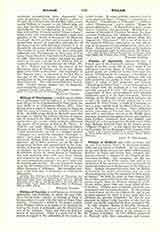

William of Champeaux, a twelfth-century Scholastic, philosopher, and theologian, b. at Champeaux, near Melun, in the neighborhood of Paris, about the year 1070; d. at Chalons-sur-Marne, 1121. After having been a pupil of Anselm of Laon, he began in 1103 his career as teacher at the cathedral school of Paris. In 1108, owing chiefly to Abelard’s successful attempts to criticise his realistic doctrine of universals, he retired to the Abbey of St. Victor and there continued to give lessons which, no doubt, influenced the mystic school known as that of St. Victor. In 1113 he was made Bishop of Chalons-sur-Marne. Portions of his work “De origine animw” and of a “Liber sententiarum”, as well as a dialogue entitled “Dialogus seu altercatio cujusdam Christiani et Judaei”, have come down to us. On the problem of universals William held successively a variety of opinions. All of these, however, are on the side of exaggerated Realism and opposed both to the Nominalism of Roscelin and to the modified Nominalism of Abelard. In his treatise on the origin of the soul he definitely rejects the theory known as Traducianism and maintains that each and every human soul originates by the creative act of God. Among his contemporaries he enjoyed a very great reputation for learning and sanctity. He was, moreover, looked upon by the conservative thinkers of that age as the ablest champion of orthodoxy. His creationist doctrine is his chief title to distinction as a Scholastic philosopher.
WILLIAM TURNER

